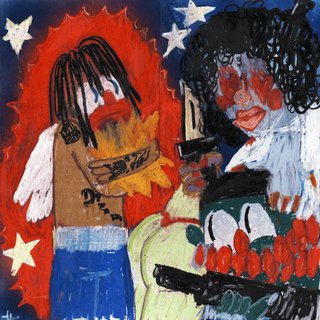Describing new rap artists in 2024 can be like arguing over a sprawling cork investigation board, multi-coloured strings overlapping in a jumbled spider web: “they’re clearly influenced by this rapper – no, actually this artist actually did it first.”
Or you know, you can just give up and assert that Lil Wayne/Chief Keef/Lil B did it first (usually not entirely untrue).
Does classification even matter anymore? We’ve long run out of genre names (trap, dubstep and EDM mean radically different things to different people), especially since the internet has exploded any sense of musical rules and conventions. Yet, there’s still some joy in untangling that nexus of influences, especially in a genre as alive, as ever-changing as hip-hop.
Some of those coloured corkboard strings lead to more obvious, defined clusters; the melodic trap (again, probably not a real genre) school of hundreds of forgotten Soundcloud rap pioneers. The current meta of this sound has spawned a new strand: the, apocalyptic sound of ‘rage beats’, influenced by Playboi Carti Whole Lotta Red-era baby voices and gleefully overblown, ear-splitting 808s.
Nottingham rapper and producer skaiwater is an obvious alumni of this school, and their new album, #gigi is a worthy entry to its canon. skaiwater has the razor-sharp, whiplike flow of their best contemporaries; rapping alongside the beat like a rollercoaster threatening to veer of the tracks – not totally out control though, but a measured chaos, like the interplay of a free jazz band continually pushing each each other in and out of the pocket. At times skaiwater is swallowed completely by waves of distortion, only coming up for air in gulps; other times, that same distortion flickers just ever so gently, like gentle shadows around their crooning voice.
There’s a interesting and intentional bent to #gigi that sets it apart from others in the genre. It’s exhilarating in the way the best internet deep dives are, but with a level of polish to it – not that polish is always necessary, but there’s something fascinating about using a major label budget to squeeze the most out of these often bootleg sounds.
It also gives the record a thrilling, kaleidoscopic range – like the thundering, brazilian funk beat of ‘richest girl alive,’ which slides seamlessly into the ballroom-influenced ‘choke’. Any influence is up for grabs, be it sweaty jersey club, or even old school, waltzing soul. Choirs and broadway string sections are steamrolled by booming bass that sounds like it was summoned from the earth’s very core – yes, it’s silly, but it works. Especially so when you view #gigi as a breakup album of sorts. Again, distortion creatively helps skaiwater to cathartically navigate these messy feelings: heartbreak, scorn, and ‘crying in the shower, 100 degrees’, burying them all under walls of sound, free to cry out to their heart’s content.
Other artists tinkering with rage beats push this sound to its limit; skaiwater instead approaches it with a curiosity, ready to upturn any convention on its head. Whether #gigi will inspire a new, branching string of its own is too early to say – but its place on the board, worthy amongst its peers, is undeniable.
Words by Lindsay Riley
